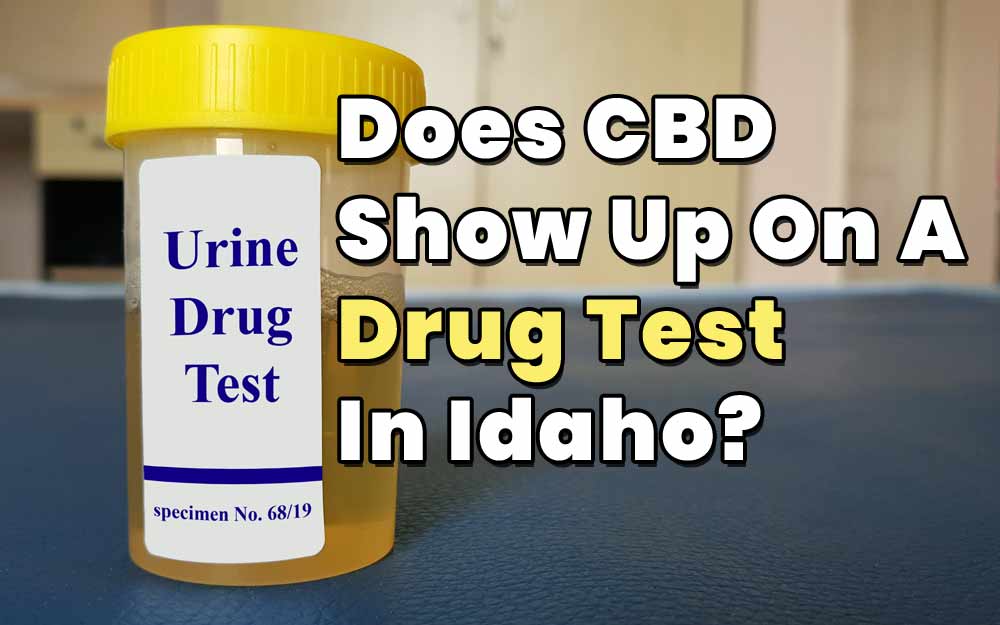Updated: February 9, 2023
Cannabidiol (CBD) itself does not show up on drug tests, but THC does. However, some cannabinoids may trigger a false positive. If your situation has a zero-tolerance policy, it may be best to abstain from using any cannabinoid.
Many CBD products have THC in them, the trick to knowing how to identify if your CBD products have zero (no detectable) THC.
Standard routine workplace drug testing does not screen for the cannabidiol (CBD) molecule. We confirmed that workplace drug tests do not test for CBD by asking three drug testing companies and they affirmed that no current routine drug test is actually looking for CBD. Urine testing, drug testing kits, saliva tests, etc, can only detect the tetrahydrocannabinol (THC) molecule, not CBD.
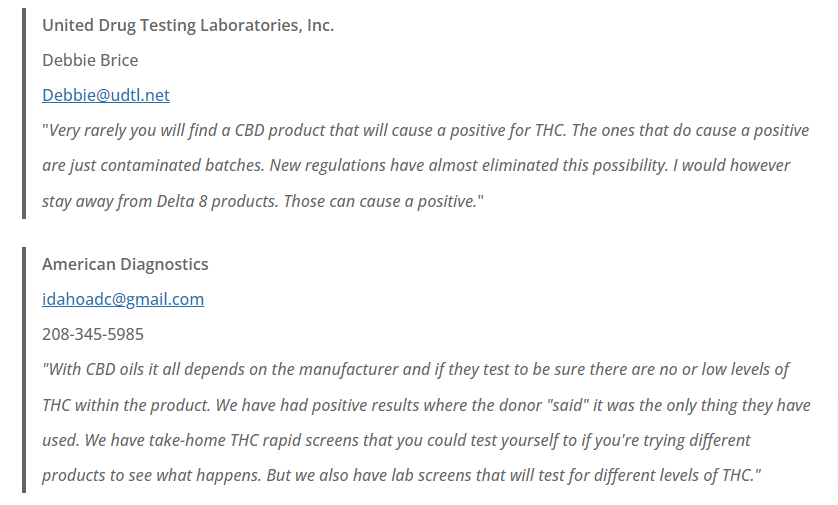
However, even though drug tests can’t find CBD isolate, many cannabis and hemp-derived CBD products contain trace amounts of THC and those products can make you test positive and fail a drug test.
To avoid failing a drug test, make sure you’re consuming products that are THC-free. Zero THC hemp products include Hemp Seed Oil, CBD isolate, AND broad-spectrum CBD products including tinctures, edibles, vapes, creams, and much more.
CBD products that will make you fail a drug test include; all full-spectrum CBD products, delta 8, delta 10, HHC, THC-O, THC-P, and all other variations of the THC molecule that can make you fail.
Today, we’ll explore the best way to pass routine workplace drug tests, even if you still want to take CBD. In short, most drug testing companies recommend that if you want to be 100% guaranteed to pass a drug test, avoid any CBD products.
- How Long Is Full Spectrum THC Detectable?
- How To Pass A Drug Test While Using CBD Products?
- Can CBD trigger a false positive drug test?
- Does CBD show up on a 10-panel drug screen?
- Can you fight a false positive drug test?
- What do you mean certain CBD products might contain THC?
- How much THC must be present to register on a drug test?
- Can CBD turn into THC in the body?
- How You Can Fail A Drug Test When Taking CBD Products?
- Can You Fail A Drug Test Due To CBD? Extensive Detail Below
- Drug Testing Labs On Drug Testing For CBD?
- Does CBD oil have THC in it?
- Does broad-spectrum CBD show up on a drug test?
- How to detect CBD in the human body?
How Long Is Full Spectrum THC Detectable?
Since there are currently no testing procedures designed specifically to identify the CBD molecule, tests are limited to only THC.
Many CBD products will have THC in them, even if it’s in trace amounts, if you take them regularly there’s a high likelihood that you will have enough THC buildup in your system that can make you have a false positive result.
Types of drug tests and the average time THC is detectable.
- Blood: Days, weeks, or more
- Urine: Up to 30 days or more
- Saliva: Up to 35 hours or more.
- Hair: Up to 90 days.
Before consuming CBD products that claim to have zero THC in them, make sure you’re looking at the lab test to verify there are not even small trace amounts of THC that could cause you to pop positive for marijuana.
How To Pass A Drug Test While Using CBD Products?
In general, to pass a drug test when taking CBD, you want to completely avoid products that have any amounts of THC in them AND/OR just simply avoid CBD products that you consume.
CBD isolate products are 99.99% pure CBD and CBD topical creams are the safest ways to take CBD.
While the CBD industry regulations and standardized manufacturing practices are continuing to develop, there’s no real government oversight verifying your products are completely free from THC.
To maximize your chances of passing a drug test, it’s best to take CBD products that have no detectable amounts of THC and verified on a lab report.

Can CBD trigger a false positive drug test?
Most, if not all, common drug tests are looking for the THC metabolite. Upon scouring the internet, I couldn’t find a specific drug test that looks for CBD.
The federal workplace limit of THC you can have in your system — for an immunoassay screening test — is 50 nanograms (ng) per milliliter of urine (one ng is one-billionth of a gram).
With a more specific confirmatory test, a positive result will occur if you have more than 55 ng/mL.
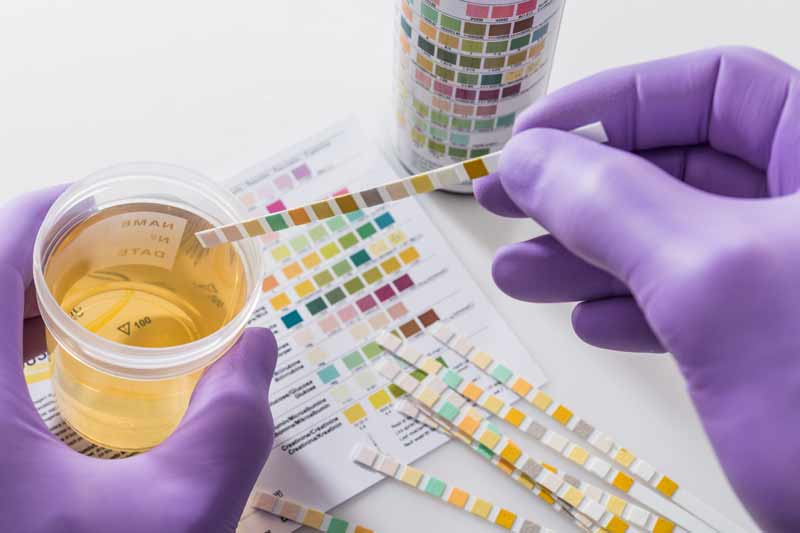
Does CBD show up on a 10-panel drug screen?
There are several different types of drug panel tests that can test for one drug and up to 20 or more types of drugs.
Most employers utilize some form of initial screening test and won’t typically have you take a confirmatory drug test with advanced gas chromatography or mass spectrometry.
A 20-panel urine drug test, tests for a wide range of drugs, including THC, but, not specifically CBD.
Can you fight a false positive drug test?
If you believe you might fail a drug test, it’s best to come forward and disclose everything you believe might make you fail, before you take the test.
According to a Top Rated Mental Health & Substance Abuse Treatment facility, many things can make you fail a drug test including foods (granola bar), Sudafed, Ibuprofen, Antiretroviral, Sertraline, Poppy Seeds, Passive Weed Smoke, OTC Cold Medication, and more.
Furthermore, Drugs.com (medically reviewed by a pharmacist) reports that all drug tests can have up to a 10% false positive rate.
To dispute a false positive drug test, you can.
- Ask for a re-test.
- Ask for a special full spectrum CBD drug test (LabCorp Test #701907) that detects the CBD/THC ratio, proving you’re taking CBD products – not smoking marijuana.
- Consult an attorney.
- Sign up for the course on How To Win In Court Without A Lawyer (affiliate link) depending on the laws in your jurisdiction, you may be able to find a way to sue your employer for wrongful termination.
If you can’t afford an attorney, the How To Win In Court course is currently only $249 for the first year and then $89 for the next year. On average, lawyers cost that much PER HOUR.
The How To Win In Court website has lots of free resources you can use to help you get started.
Can You Sue a CBD Company for making you fail a drug test?
Since CBD was federally legalized by President Donald Trump via the 2018 Farm Bill, YES you can now sue CBD companies.
Before spending thousands of dollars consulting with a lawyer, the most cost-effective way to attempt to see if you have the ability to sue a CBD company is to study the How To Win In Court Without A Lawyer course (affiliate link) that was created by a lawyer with over 30 years of practicing law.
To sue a CBD company, you need to first find the court that controls their jurisdiction.
Once you find the court that controls their jurisdiction, you need to decide what CLAIM you’re going to file that has the best chance of you getting your outcome.
According to an article published on JDSUPRA, there are several recommended ways a CBD company can avoid a potential lawsuit.
Another story published on Consumer Reports tells the story of CBD companies getting sued for mislabeled products, products with more THC in them, etc.
A reasonable starting point on how to figure out how you’re going to sue a CBD company is to find out what the common advice is on how CBD companies are trying to avoid a lawsuit.
What do you mean certain CBD products might contain THC?
There are dozens of CBD products and all full-spectrum, whole plant, distillate, and hemp-smokable flowers will have THC in them.
What are the different types of CBD?
There are three general types of CBD products.
- Full-spectrum (has THC)
- Broad spectrum (no THC)
- Isolate (no THC)
From these three general types of CBD products are dozens of methods of consuming these types of CBD products.
Many CBD companies are getting creative with their marketing and adding different fancy words for products that also have THC in them including Whole Flower and Distilled — both of which have THC in them and can make you fail a drug test.
CBD Oil products that do not have THC
Two types of CBD products do not have any THC and are not detectable on a drug test.
Full spectrum has THC and is detectable on a drug test.
Non detectable CBD oil products include.
- Broad-Spectrum
- Isolate
*We live in Idaho and these are the two CBD products we use regularly and recommend to our family.
Companies can make mistakes. Before buying any CBD product, it’s best to look at a recent Certificate Of Analysis (COA) to verify there are no detectable amounts of THC in your product’s batch.
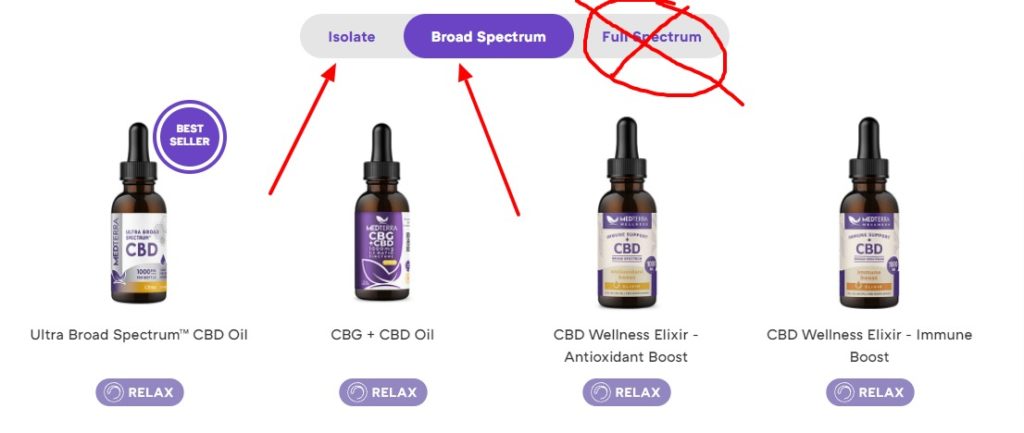
How much THC must be present to register on a drug test?
Depending on how your body processes THC, any amount of THC can make you fail a routine drug test.
The technical cut-off limit for lab use is anything more than 50 nanograms per milliliter can cause of positive drug test.
Can CBD turn into THC in the body?
According to the medical journal Cannabis And Cannabinoid Research, CBD can convert (transform) into THC via acidic conditions.
Currently, large CBD manufacturing facilities are taking their extra CBD isolate and using a certain type of acid to convert it into delta 8 THC.
When chatting with a worker at a drug testing company (video below), he took CBD and then took a drug test and he claims he couldn’t pass a drug test.
When in doubt, and if your livelihood depends on it, they recommend you do not take any type of CBD.
How You Can Fail A Drug Test When Taking CBD Products?
The easiest way to fail a drug test is with full-spectrum CBD products.

Not only are full-spectrum CBD products illegal in Idaho and several other states, but there’s enough THC in all full-spectrum CBD products that can make you fail a drug test.
No matter how small trace amounts of THC exist in full-spectrum CBD products, any detectable trace amounts have the potential to make you not pass a standard routine drug test.
Is Full Spectrum CBD Detectable?
In general, if you’re taking full-spectrum CBD, you’re at risk of failing a standard drug test.
By definition, full-spectrum CBD products contain the full range of cannabinoids including the THC molecule that will make you fail a drug test.
Full-spectrum CBD products include.
- CBD Hemp Flower
- Full-Spectrum CBD Oil
- Mislabeled CBD Products (THC FREE or ZERO THC)
All CBD flowers are full-spectrum products.
Mislabeled, misrepresented, manufacturing error (cross-contamination), or hard-to-find lab testing results can result in THC in your CBD product.
Below, we’ll show you extensive detail about how to find and read the lab testing results to verify if there’s THC detectable in your product.
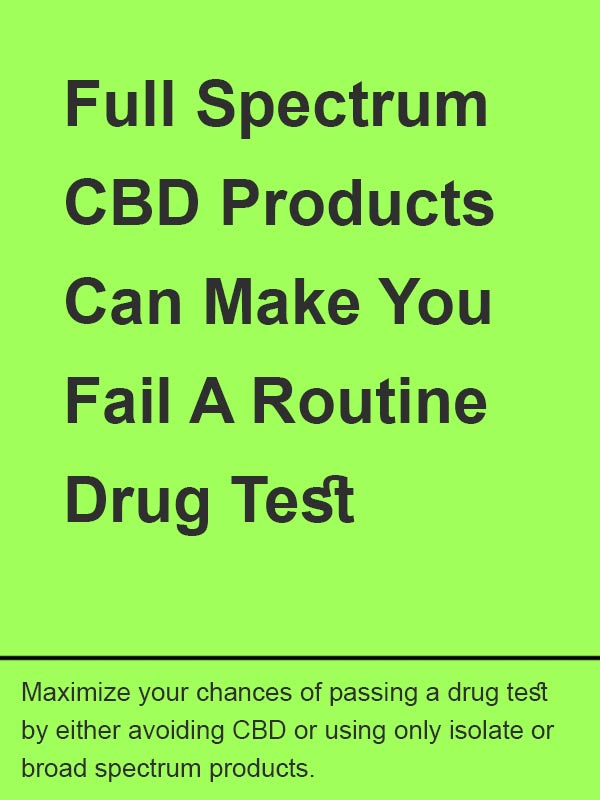
Can You Fail A Drug Test Due To CBD? Extensive Detail Below
Failing a drug test could mean losing your job, not getting a job, going back to jail, or your doctors stopping all treatment.
- CBD will not make you fail a drug test.
- Only THC can make you fail a drug test because the drug testing labs only screen for various levels of THC.
Drug testing labs offer cheap take-home rapid THC screening test kits you can buy from them if you want to try different products and see what the results produce to be sure.
After understanding, Idaho CBD law states CBD products are legal if there are no detectable amounts of THC (0.00000% THC).
Since Idaho law says CBD is legal if there are no detectable amounts of THC (not even trace amounts), the only other real concern is wondering if your CBD oil actually has no detectable amounts of THC.
Failing an important drug test because a label said it was THC-FREE or ZERO-THC doesn’t make the manufacturer liable.
You are ultimately responsible for if you want to add CBD to your routine.
To feel 100% comfortable and absolutely certain your CBD product is completely clean of THC, you need to look at the Certificate Of Analysis (COA) your CBD brand should have available for you to review and verify there’s no THC in the product you’re about to purchase and use regularly – with doctor approval.
Furthermore, if your doctor didn’t mention this, you need to be aware that CBD interacts with certain medications.
With several sources (MD, Pharm.D., & drug testing labs) saying drug tests don’t screen for CBD – it must be true.
- According to a Healthline article, CBD should not show up on a drug test.
- Drugs.com also echoes that CBD shouldn’t show on a drug test.
- Medical News Today confirms drug tests don’t screen for CBD.
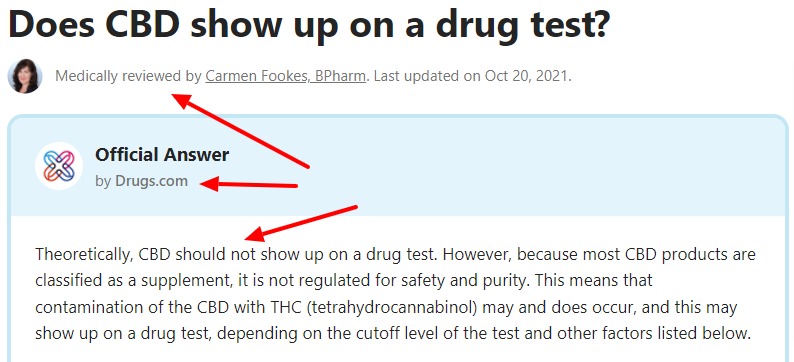
The only cannabis or hemp-based molecule drug testing labs look for is the THC molecule and most all other variations (isomers) of THC.
THC isomers that can cause you to fail a drug test include.
- D9-THC
- THCA
- THCV
- D8-THC
- D10THC
- D9-THCP
- And potentially many more including synthetic THC
** Make sure you look at the certificate of analysis of the CBD product you’re about to purchase to verify there are No Detectable (ND) amounts of THC that are both illegal in Idaho and could also make you fail a drug test. **
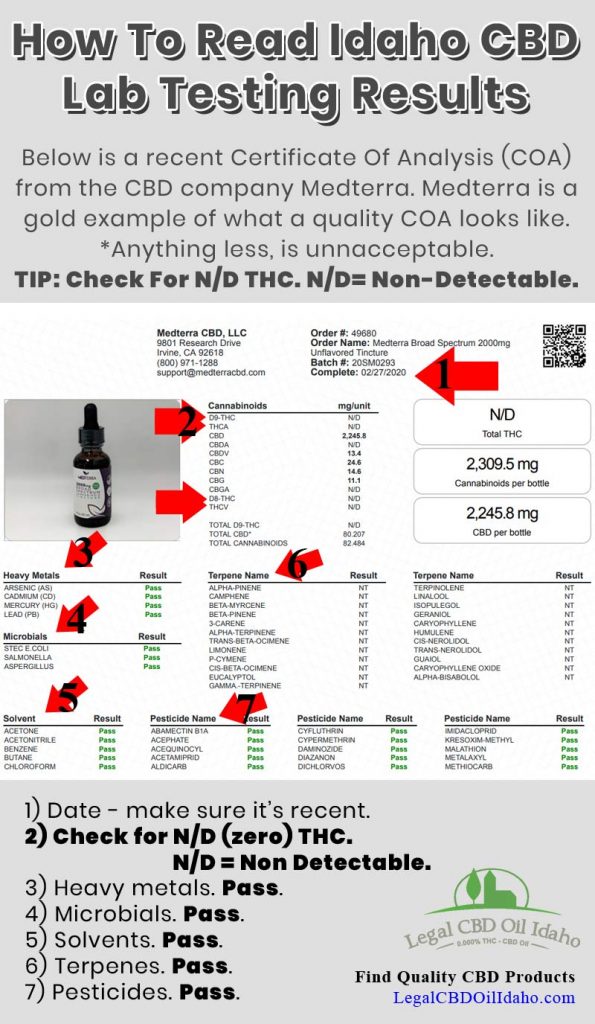
Some CBD products can make you fail a drug test.
The most common type of CBD products that could make you test positive for THC are the full-spectrum CBD products.
Full-spectrum CBD products are allowed to have up to 0.3% THC, but no more.
Idaho law doesn’t allow CBD products with any amounts of THC.
This makes all full-spectrum products illegal in Idaho.
Since full-spectrum CBD products can contain up to 0.3% THC, this small amount can cause you to fail a drug test by testing positive for THC.
To avoid failing a drug test, it’s recommended you do “not” take a full-spectrum CBD product.
Full-spectrum CBD products have the illegal THC molecule drug tests are looking for.
Even though drug tests mostly only look for THC, broad-spectrum CBD products do “not” contain THC quantities.
Few CBD companies offer true broad-spec CBD products, while also verifying there are no detectable amounts of THC.
To verify zero THC, ISO 17025-accredited lab testing facilities provide a Certificate Of Analysis (COA) with every batch.
The proper COA provides information verifying there’s zero THC and much more.
The ISO 17025 accreditation is an international testing standard qualification demonstrating operational competence in generating valid results.
Below, we’ll go into more extensive detail on how drug testing is performed and other ancillary questions that help you feel more comfortable in adding CBD to your routine.
Drug Testing Labs On Drug Testing For CBD?
After emailing about a dozen different drug testing labs in Idaho, only two responded to my inquiry.
Here are the responses, name, and contact information of the person responding if you have more follow-up questions that I might have missed that you’d like to ask them.
If you do contact them and receive more information that I don’t have published, I ask that you please reach out and inform me of any information that I might need to update to reflect potential lab testing standards or updates.
Initial email of questions to Idaho drug testing laboratories.
Curious if you drug test for CBD (cannabidiol)? Can I fail a drug test for CBD only?
I’m looking at the COA for this CBD product.
https://medterracbd.com/product-cbd-oil-tinctureAnd, it says ND for D9-THC, THCA, THCV, D8-THC, D10THC, D9-THCP, etc.
Curious what cannabinoids you drug test for? Will any “non” THC isomer cause a positive drug test for a THC metabolite?
Also, if I do for some reason end up testing positive, is there a more specific drug test that verifies I have no THC in my system?
United Drug Testing Laboratories, Inc.
Debbie Brice
Debbie@udtl.net
“Very rarely you will find a CBD product that will cause a positive for THC. The ones that do cause a positive are just contaminated batches. New regulations have almost eliminated this possibility. I would however stay away from Delta 8 products. Those can cause a positive.“
American Diagnostics
idahoadc@gmail.com
208-345-5985
“With CBD oils it all depends on the manufacturer and if they test to be sure there are no or low levels of THC within the product. We have had positive results where the donor “said” it was the only thing they have used. We have take-home THC rapid screens that you could test yourself to if you’re trying different products to see what happens. But we also have lab screens that will test for different levels of THC.”
I also called up a local drug testing lab and audio recorded my conversation with the office worker who collects the sample (who will remain anonymous) and knew quite a bit about some specifics in how you might want to proceed with taking CBD.
The first question I asked was if they tested for CBD, but I think he was a little confused and thought I might have meant THC to which he responded that they do THC tests.
I understand that there’s still a lot of confusion around CBD, this is the purpose of going through the process of actually getting to the bottom of the truth while making critical distinctions to the accuracy of the information we’re seeking.
Next, I asked him if I were to take a 100% CBD product that has no detectable amounts of THC (verified by a COA), he also was a bit confused.
Throughout our conversation, he acknowledges that it can be risky to take a CBD oil from a low-quality untrusted brand that doesn’t lab test their products to verify there’s absolutely no detectable amounts of THC.
CBD products on Amazon will not tell you or show you a COA of the exact cannabinoids, gas station brands are probably high risk, and any full spectrum CBD product can cause you to potentially test positive for THC.
One excellent piece of information the sample collection worker provided was to buy a THC testing kit directly from the drug testing lab for $10, and not a grocery store test because CVS tests aren’t as sensitive as the THC testing kit you can get from an actual drug testing lab.
Buying a THC testing kit directly from a drug testing lab will allow you to test for lower levels of THC in your system and provide you with more accurate results.
The only incorrect thing the sample collector said that was false was that CBD is made from THC.
CBD is not made from THC.
Both CBD and THC are two separate distinct cannabinoid molecules.
While both CBD and THC come from the same cannabis or hemp plant, there is a 100% difference between the two.
CBD is legal worldwide, Olympic athletes are allowed to use it, etc.
Furthermore, science has identified approximately 113 different cannabinoids and the only illegal cannabinoid is THC plus any variation of THC.
THC is the only cannabinoid molecule that will get you high and cause a psychoactive intoxicating effect.
Whereas, CBD is legal and does not get you high, nor does CBD give you any psychoactive intoxicating effect.
Does CBD oil have THC in it?
Full-spectrum CBD oil is the only type of hemp CBD oil to have THC in it. Even though President Trump legalized hemp, the federal law still allows up to 0.3% THC to be present in most CBD products.
Idaho law is more strict and says hemp CBD products can “not” have any quantities of THC present. If there are even trace detectable amounts of THC in Idaho CBD oil, Idaho law says it’s illegal marijuana.
Some CBD products have zero THC and the best type of CBD is broad-spectrum.
Does broad-spectrum CBD show up on a drug test?
According to Drugs.com, the primary concern is the psychoactive THC (tetrahydrocannabinol) molecule.
Broad-spectrum CBD products do “not” have any of the four types of THC (D9-THC, D8-THC, THCa, & THCv), therefore, a standard drug test will not look for or detect any other cannabinoid besides the THC molecule.
What is broad-spectrum CBD?
There are three types of CBD products full, broad, and isolate.
Idaho residents only really need to completely stay away from full-spectrum CBD products.
The primary reason to avoid full-spectrum CBD products is that federal law allows there to be up to 0.3% THC. Whereas Idaho law states there can be no detectable amounts of THC.
CBD isolate products only contain purified CBD powder.
The main problem with CBD isolate products is they have to overcome the bell-shaped dose-response curve.
This curve essentially means CBD isolate products require a very precise dose to even get a minimal effect.
If you’re looking for a more effective CBD product, you won’t find much benefit in a CBD isolate product.
Broad-spectrum CBD products are the best for Idaho residents.
A good broad-spectrum CBD product will have more than just the CBD molecule and can contain more than 100 different cannabinoids.
The more variety of different cannabinoids, the better.
With a wide range of cannabinoids, you get the added benefit of the entourage effect.
The entourage effect simply means having a wider range of cannabinoids makes each other cannabinoid work better because they interact with each other to produce a powerful synergistic response.
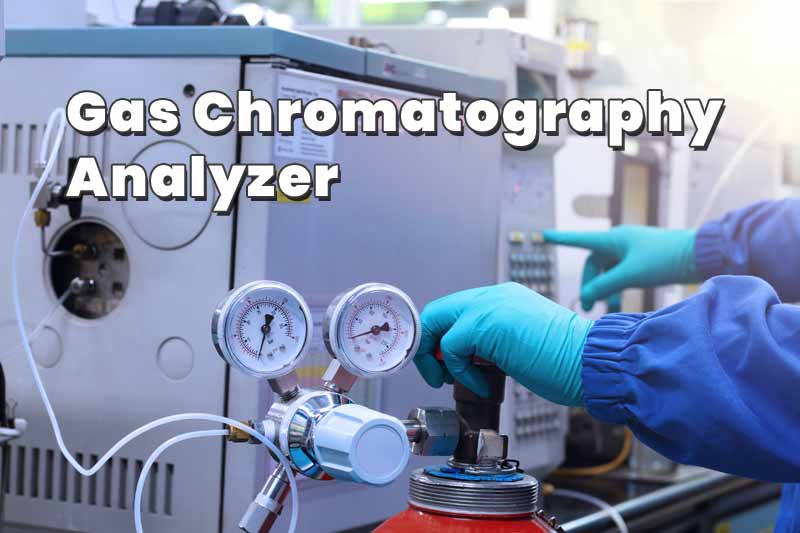
How to detect CBD in the human body?
Drugs.com reveals several biological specimens that can be used to test for the presence of drugs.
Specimens can include urine, hair, blood, saliva, sweat, toe & fingernails, and meconium (stool).
Most drug testing uses urine due to the non-invasive nature and the ease of collecting a sample.
Urine will typically have higher concentrations as well as being present for a longer duration.
When testing for specific drugs, the test will either look for the parent drug or one of the metabolites (byproducts).
Two primary urine drug tests are either screening or confirmation testing.
All types look to detect the actual presence of certain specific drug metabolites or a class.
The unfortunate part of these antibody tests is that drugs with similar characteristics might get detected and result in a false-positive.
Pain management clinics typically favor using a form of visual test that displays drug testing results with different colors.
These types of tests are open to interpretation, due to the potential difficulty of reading certain faint or uncertain colors.
Drugs.com continues explaining how this visual test should “only” be a type of preliminary test and should require a confirmatory laboratory drug test to verify the initial results.
Best practices state a much more specific confirmatory test should be conducted following a potentially false-positive initial visual color screening test.
Final confirmatory drug testing utilizes advanced gas chromatography or mass spectrometry technology.
This advanced drug testing equipment can identify precise molecule structures and the specific quantities of drugs currently in the sample.
Confirmatory drug tests are more accurate than the initial screening tests, however, advanced drug testing has a higher cost and takes a lot more time to complete.
This advanced test is typically reserved for more significant drug testing requirements for academia, legal, forensic, or certain employment situations.
Gas chromatography and mass spectrometry can detect specific cannabinoids and can distinguish the difference between the CBD and THC molecules.
How long does CBD stay in the body?
How long CBD can stay in your body can depend on several factors. Factors can include how much CBD you took, the method you took it, body size, other drugs you taking, etc.
According to Healthline, the effects of CBD can last between 2 – 6 hours. And CBD can stay in your system for 2 – 5 days, more or less, depending on several factors.
How long is CBD detectable in blood?
The medical journal Pharmacology, Biochemistry, and Behavior says that CBD is virtually undetectable — in blood plasma — after one week of discontinuing use.
In this study, participants took approximately 700 mg of CBD per day for six weeks. They tested participants using gas chromatography-mass spectroscopy and other specifics.
In general, CBD stays in your system.
- Saliva, only a few hours
- Blood, up to a week
- Urine, a few weeks
Another study published in the Frontiers In Pharmacology looked at ten different publications and found the half-life (elimination) of CBD ranged between one hour to five days.
Depending on how the CBD was administered and the dosage determined how long CBD stayed in your system.

